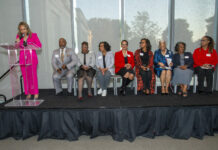
April is Sexual Assault Awareness Month, an occasion UofL’s PEACC Center recently marked with its annual Take Back the Night march and rally on campus.
The event, held in conjunction with others like it worldwide, protests sexual violence. It included a resource fair, candlelight vigil and speakers Shannon VanLandingham of bemorelikeclaire.org, UofL graduate Rachel Williams and Karina Barillas of La Casita Center.
According to Program Manager Tisha Pletcher, the event was especially profound this year, as it comes at a time of unprecedented growth in requests for services from the center.

In the last three years, the number of people seeking assistance for the effects of sexual assault and rape, domestic violence and stalking has more than tripled, growing from 28 students in the 2014/15 academic year to 102 students last year. Pletcher said 92 students sought PEACC services last semester alone.
“It’s been unprecedented, these last few years,” she said. “I think it’s due to everything we’ve seen happening locally, nationally and globally. People are speaking out in a very public way now.”
Events like the #MeToo movement, the Women’s March and high-profile sexual assault cases like that of Bill Cosby, have sparked a greater awareness and helped lift the veil of stigma and shame.
“People are seeing others who’ve experienced something similar to them, who have carried on and become successful. They see they’re not alone in this,” Pletcher said.
PEACC was particularly busy during the weeks surrounding the high profile hearings for Supreme Court Justice Brett Kavanaugh, who was accused of sexual assault by Christine Blasey Ford.
“Our numbers doubled those weeks,” Pletcher said. “We heard from numerous students who came in and said ‘I’m just so triggered by this and I need some support.’”
PEACC, which is a part of Campus Health Services, offers a gamut of services including prevention education, community advocacy and initial crisis counseling.
Pletcher says for those seeking counseling, staff will listen and gently ask questions to discern what victims need, and help connect them with those resources, whether it’s the police or obtaining a protective order.
They also facilitate survivor network, a private group for those who have had experienced sexual violence, dating violence or/and stalking, that meets twice a month. There are 115 members.
“We let the group make it whatever the members need it to be,” she said. “We just provide the infrastructure to allow it to happen.”






























